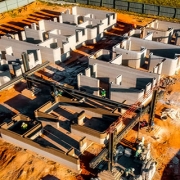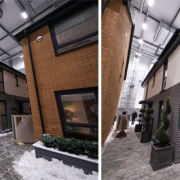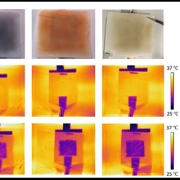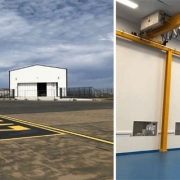HOLCIM’S 14TREES BEATS OTHER
3D PRINTING COMPANIES IN
THE RACE TO CREATE AFFORDABLE HOUSING
- From Oct. 2022 to Jan. 2023, 14Trees 3D printed 10 houses in Kilifi, Kenya, averaging one house per week
- 6 three-bedrooms (76 m2 / 836 SF) and 4 two-bedrooms (56 m2 / 616 SF) houses have been 3D printed so far, making Mvule Gardens in Kilifi the largest 3D printed project to date
- No other completed 3D construction printing project is currently larger than that, in the US or elsewhere
- The fastest time to print one house in the Mvule Gardens project was 18 hours. See the video here: link
- No other 3D construction printing project has matched 14Trees productivity, in the US or elsewhere
For a long time, 3D construction printing has been seen as a possible solution to the escalating affordable housing crisis. Proponents of the technology claim, that when 3D printing projects in construction are carried out at scale, the advantages of the technology become clear. Evidence of that claim has been lacking, but recent developments actually provide credibility to the statement.
14Trees is a joint venture company between the cement and concrete giant Holcim and British International Investment dedicated to accelerating the provision of affordable housing in Africa. The joint venture is behind the first 3D printed houses in Africa and the first 3D printed schools in the world. This week 14Trees announced some of the initial results of their efforts to 3D print up to 52 houses in Kilifi, Kenya, using a single BOD2 printer from COBOD. The BOD2 is the world’s best-selling construction 3D printer. Following the start in October 2022, 14Trees completed the 3D printing of the walls of 10 houses in January 2023 after just 10 weeks using only one printer.
In addition, the project’s sustainability profile also attained an EDGE Advanced sustainable design certification by IFC, the World Bank’s development finance institution, which recognizes resource-efficient buildings with the potential to be zero-carbon. It is the first time a 3D printed housing project has attained this certification.
Commenting on the achievements, Francois Perrot, Managing Director of 14Trees said:
“With 3D printing, you can solve two problems at once. You can build faster like we have shown here with our 10 houses in 10 weeks. At the same time, we can achieve better cost efficiency, which will help make affordable housing a reality for the majority. In addition, you can build with less materials, which preserves the resources of the planet for future generations.”
14Trees intends to get the full benefit of the large-scale project by experimenting and innovating as the project progresses. During the next phases which consist of 10-15 houses each, several innovations will be included that will allow future tenants to design their homes and move away from the standardized 3D printed approach to one which fully leverages the technology’s customization possibilities.
The cost of construction is also an area of focus. With each phase, 14Trees is aiming at lowering construction costs further such that the build cost is 20% lower than standard houses. Using Holcim’s proprietary 3D printing materials, TectorPrint, made at a local plant, has already meant a significant reduction in costs.
14Trees is not the only company busy with construction 3D printing projects of multiple housing units. Especially in the US several large-scale have been announced, including a venture-backed US-based construction 3D printing company’s 100 houses project, which attracted global media coverage when they began printing in early November 2022 (announced 2021) at a site where 5 or more identical printers were used simultaneously. As of early February, three months after the printing began, reports show that less than 9 houses had been printed so far. Commenting on the performance of 14Trees in relation to the developments in the US, Philip Lund-Nielsen, Head of COBOD Americas stated:
“Considering how difficult the conditions are in Africa, it is impressive, that 14Trees has printed more houses on a single site, than any other construction 3D printing company in the US or elsewhere. In addition, they have done it faster, using just a single COBOD 3D printer not by using 5 printers or more”.












